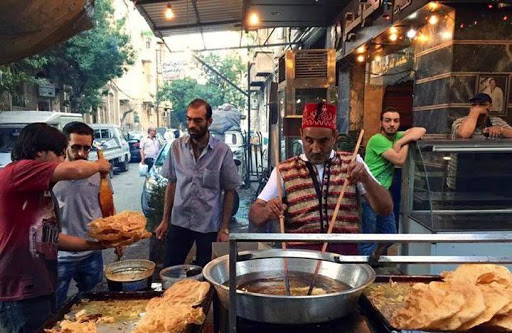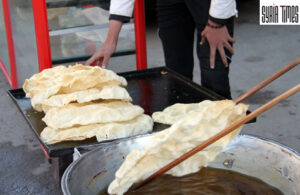The traditional wafer-thin crispy pancake called “Naaem” is still one of the few affordable desserts that fasting people can buy from street vendors who make them in copper cauldrons all over the sidewalks during the month of Ramadan in Syria.
The crispy pancake, which is also called “ Ramadan Bread” is prepared by dropping a thin circle of dough into hot oil until it snaps like a crisp and then it is sprayed with date molasses.
Ziad, a father of 2 sons, told Syria Times: “ All my family’s members love it. I could only buy three big-size-circles of Naem every 5 days because the price of them is 10.000 Syrian pounds [$1.3], while the price of the small size is 8000 Syrian Pounds [$1.0]….Unfortunately, the sky-high prices put a lot of food items and sweets off the menu of Iftar.”
Another man, who was buying Naem from a street vendor in Rekn El-Din district in Damascus told us: “Naem is a tradition that we can’t go without during Ramadan….My children love it and it is one the desserts which could be taken when we go to share Iftar with our relatives in Ramadan.
The vendor, Abo Omar, said that he inherited the method of preparing Naem from his father, who has more than 40 years experience in this field. “We are used to preparing this traditional dessert one hour before sundown. This dessert dates back to nearly 200 years ago.”
It is said that the Damascenes invented this dessert during the Ottoman era when poverty and famine prevailed with the aim of storing and preserving food for a long time in most provinces.
Ahmad, another vendor told us : “The dough of Naem is composed of flour and water, and here lies the secret. The dough is prepared three months before Ramadan, and is placed in round molds smeared with oil so that it does not stick to the pot. After that it is put in an oven at low temperatures to become a bread, and then we put the breads on mesh tables about a meter and a half away from the ground to be exposed to the sun for three months to dry. The dried breads are stored in large boxes that are opened and used during the month of Ramadan.”
Both poor and rich people buy this dessert.
Interviewed by: Basma Qaddour
You might also like


 The vendor, Abo Omar, said that he inherited the method of preparing Naem from his father, who has more than 40 years experience in this field. “We are used to preparing this traditional dessert one hour before sundown. This dessert dates back to nearly 200 years ago.”
The vendor, Abo Omar, said that he inherited the method of preparing Naem from his father, who has more than 40 years experience in this field. “We are used to preparing this traditional dessert one hour before sundown. This dessert dates back to nearly 200 years ago.”